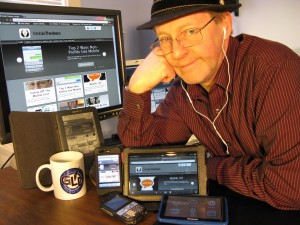 Almost a century ago, American Telephone and Telegraph (AT&T) considered the prospect of a wireless telephone but quickly abandoned the idea. That might seem shortsighted today, but with a total U.S. population at that time of 180 million, the idea of a future with more than 320 million wireless subscribers was unimaginable.
Almost a century ago, American Telephone and Telegraph (AT&T) considered the prospect of a wireless telephone but quickly abandoned the idea. That might seem shortsighted today, but with a total U.S. population at that time of 180 million, the idea of a future with more than 320 million wireless subscribers was unimaginable.
The information superhighway (Do people even use that phrase anymore?) is truly at our fingertips and it’s also in our pockets or purses and on our hips. It’s everywhere and it’s with everyone! At the grocery, at the mall, at work, stuck in traffic, at a boring neighbor’s barbecue; and it is only getting better and faster.
But, like the song says, every rose has its thorn and there is an ugly downside of the mobile frenzy – constant connectivity. In the blink of an eye, we were unable to escape the beep, buzz, and ringtone of our smartphones and iPads. It was hard enough to get away from the daily grind when we weren’t carrying the office around in a hip pocket, but now it’s nearly impossible.
The constant mobile distraction is certainly not limited to business professionals, or even adults. School districts have now begun to ban smartphones from classrooms and even entire school grounds just to keep the students’ attention. We are so connected that we’re even missing out on some of life’s most amazing events.
A friend recently shared an anecdote about a man who was in the delivery room for the birth of his first child. Amidst all the breathing and pushing, he was preoccupied with his cell phone, texting with someone about work. Before he realized it, the baby had been born and he totally missed it. I don’t know how true that story is, but it’s not impossible to imagine.
And then there’s me. Since my first Commodore VIC-20 computer appeared under the Christmas tree in 1981, I’ve been immersed in technology. I’ve been a programmer, a database developer and a systems administrator. I’ve designed websites and developed social media marketing campaigns. Suffice to say, I know my stuff. But nothing prepared me for how mobile technology was going to grab my life and shake it like a rag in a dog’s mouth!
As a self-employed freelance writer, my day is spent connected to some kind of technology from the time I wake up until I pass out from exhaustion 20 hours later. From my iPhone to my Kindle Fire, I’m constantly surrounded by WiFi gadgets and mobile broadband receivers of all kinds.
For some people, the ability to disconnect from that level of techno-submersion is a serious challenge. But, with a little trial and error, I found easy ways to disconnect without being totally out of touch.
One of the biggest problems with all of this mobility is a lack of personal boundaries, with yourself and others. Back when there were only a couple of phone extensions in the house, many families would not allow calls to be made or received past a certain time of day. A level of courtesy long since gone prevented people from calling during the dinner hour or on a holiday. With a little self discipline, the restrictions can be set regarding cell phone, email and social media time.
When you work for yourself, you don’t have the luxury of watching the clock and a home office keeps the job on your mind almost continually. Fortunately, my office is not in my home, but I’m still connected, even after I lock up for the day. Over time, it was necessary for me to impose what I call “black out” hours; when I don’t answer the phone, I don’t return emails and I don’t post on social media.
I had a particularly hard time sticking to the black outs because, at first, I was always worried about missing that one all-important call that could make or break my career. Trust me, nothing is that important. And, if it is, modern caller ID technology helps you to screen calls so you get to decide whether or not to answer.
Other people need to understand and respect your boundaries as well. Unfortunately, however, it’s up to you to educate them about your availability. Remember if you train people that you answer email, texts and phone calls at all hours, they’re likely to take advantage of that.
Here are some other suggestions that might help you keep your real and cyber lives in better harmony.
- Time your activity. Keep track of your computing time. You might be surprised how much time you actually spend with your mobile devices.
- Out of sight, out of mind. Remove your phone and other gadgets from convenient access so you won’t be continuously tempted to check texts or Facebook.
- Put down the phone and drive. Besides being safer, listening to music or just some quiet time on your commute might help ease a stressful day.
- Resurrect an old hobby. For some people, mobile computing has overtaken time once spent on more relaxing pursuits.
Finally, my best piece of advice is to just hit the off button. Shut down the laptop, eReader, and smartphone and do something with family or friends. Go for a walk, visit a museum, read a newspaper or a book – yes, they still make paper ones – just disconnect. Going off the grid a few hours a day can really help you – psychologically, emotionally and professionally.




{ 1 trackback }